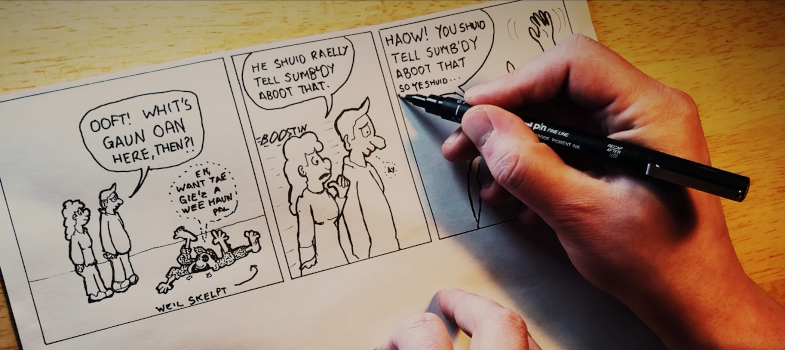At Miss Eardley's Poem - a stimulus for a play based lesson on 'Oot to play'
The children listened to the poem again and again the two
children who had picked up on ‘the big mess’ and the ‘throwing pies at the
police’ picked up on the same two points. There was not much more understanding
of the poem other than individual words or phrases ‘snotters’ ‘chuckin it doon’
were interpreted with some help and context given. We talked about going 'oot tae play' and what roles children wanted (mither/maw, faither/da, weans, wee babby).
When lining up to go out to play, we incorporated some more language. You’ll no
need a jaiket – as the weather is …? Waiting on the children response- ‘roastin’
.
We have a dirt patch which a lot of children have been rolling in this past
week. The dirt is dry and they have ended up covered in dry-mud dust. Before going outside we reminded children ‘Mind no in the muck, its
dried oot, we don’t want your claes caekit, we don’t want you to be mockit
comin in tae class. The children understood this well and some repeated the
words and laughed with one saying ‘me no dirty’ showing an understanding of the
language. Outside – children ran to the playhouse, adults prompted
speech and words. I was a little disappointed that I had to remind them
repeatedly of the Scots, I suppose my expectations were maybe a little too
high. Conversation was natural and when opportunity arose words would be
prompted. Example: one child opening and closing the small window. Every time I
peered in, I said, ‘open wee windae’, and when they slid it closed. I said, ‘shut
or close wee windae’. This became a game. The next time I said open wee…. and
they said window. I said, ‘in Scots?’ – they said ‘windae’. The same happened
when they took the play into playing ‘Polis’ some pretended to be dogs. I asked,
‘what are you now?’. The pupil said I am the police dog. I said, ‘and in Scots
what are you?’ The immediate response a ‘polis dug’. Other occasions where I asked certain pupils
there was no response. The children asked for the scooters and ride-on cars to
be brough out. I asked, ‘what the Scots word for car?’ I was met with 'coor', I
said aye well caur or motor. The child proceeded with ‘In ma wee rid motor I
can gang for miles’. Referencing Sandy Thomas Ross poem. He then continued with
a random version. I was impressed that parts/elements had stuck with them, as
that was our Burns poem in January 2024!
Other vocabulary prompted by adults: washin windaes,
Spontaneous vocabulary: ‘that hingy’, ‘crabbit’ ‘bellies’ ‘daft’,
‘get oot the hoose’ ‘wee’
Assessment was picture cards and asking for Scots words. However,
as some natural responses were given, I asked what those words meant. Verbal
children were able to give meanings. What amazed me most was that two children
in particular were able to translate short sentences into English. Next steps are to continue to incorporate Scots in our daily play sessions and celebrate its use, emphasising and repeating vocabulary to embed language.
